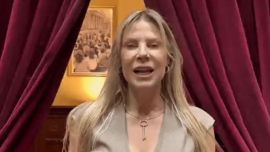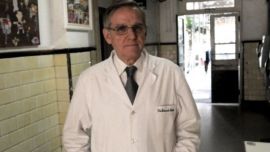Fighting off the pandemic blues while avoiding contact with Covid-19 has been made a lot easier by the First Commandant that artists throughout the world do their best to obey: “The Show Must Go On.” Since our lives were turned upside down by the virus, I have benefitted from a multitude of musicians, actors, dancers and comedians who have kept the show on the road by going online and making their work available to the wider world on YouTube.
Now I can share with you news of a show, an international festival of music and the arts, that its founder, Enrique Graf, has decided must go on too. It is an encore performance of the Festival Internacional de Colonia. From November 11 through November 15, a simple click will deliver you a selection of the best programmes from last year’s incarnation of the event and the founding edition in 2018.
The encore programme also celebrates the 25th anniversary of UNESCO’s declaration of Colonia del Sacramento as a World Heritage city. Thanks to that designation, the Uruguayan gem has been granted protection under an international UN convention. Colonia is one of 250 cities – ranging, alphabetically, from Aceh in Indonesia, to Zacatecas, Mexico -- that have been recognised because of their importance to humanity. This year’s online recap of the festival’s finest moments will be laced into a montage of the sights and delights of this remarkably unspoiled colonial city, founded by the Portuguese in 1680. That is a mere 20 years after the founding of Charleston, the city where I now reside.
I am surprised that Charleston, which is on most “must-see” list of tourist destinations, has not received the UNICEF accolade. But I surmise that it may well be because this beautiful city, which is conservative in a good way because it preserves its ancient buildings, was in the past rancidly conservative, racist and opposed to the very concept of the United Nations. (Times do change, although not quickly enough to erase all the vestiges of an ugly history – slavery still sleeps fitfully in the collective memory.)
I have been fortunate to know two famous music festivals in their infancy: Aldeburgh, established in a tiny fishing town in the United Kingdom and Charleston, in the United States, where I have lived since 1981. When Benjamin Britten – who created The Aldeburgh Festival of Music and the Arts in 1948 – was still alive and active, I was a young reporter for The East Anglian Daily Times and I was dazzled by the friends of Britten and his partner Peter Pears, who performed at the festival. I remember vividly Edith Sitwell, the Lady Gaga of her day, if you will. For a few magical weeks, a tiny fishing village welcomed music, opera.
In those days, parts of Charleston resembled abandoned ruins. It was in the late 1970s when Gian Carlo Menotti came in search of a suitable place to stage the American half of his Festival of Two Worlds (Festival dei Due Mondi). The European half had already taken root in 1958 in Spoleto, Italy. Under Menotti, I think it is fair to say, Charleston was transformed from what was called ‘America’s best-kept secret’ into a top global tourist destination. To see Charleston at its best, you need to be in town when the Spoleto USA festival is on. Looking back to the early 1980s when I first arrived in Charleston, I recall how the slumbering city became alive during those glorious 17 days in the Spring.
Aldeburgh and Charleston’s Spoleto USA festival were created around a single person: Britten, in the Suffolk village where he lived, and Menotti in Charleston, where he took up residence each season. So is the case with Colonia: concert pianist Enrique Graf was born and raised in Uruguay, though he studied and pursued his career in the United States. His residence is in Charleston, where he was artist-in-residence at the College of Charleston until his retirement. Each summer, when his concert schedule permitted, Graf returned to Uruguay. And he eventually realised, unconsciously perhaps, that Colonia was the ideal place for a festival of music and the arts.
My wife Maud and I were lucky to be in from the start of the Colonia festival, travelling across the River Plate (said to be the widest river in the world, but the trip takes just an hour) to Uruguay from our old home in Buenos Aires. We saw how the festival worked the magic that eventually made the tiny rural village of Aldeburgh as famous as Salzburg. In Charleston, Menotti brought a fading cultural heritage back to life, a renaissance that heralded an economic boom.
Colonia, which sits on the northern bank of the estuary of the Paraná and Uruguay rivers that in turn form the Río de la Plata, is a geographic marvel. A stroll through the old city, with its cobblestone streets and thick-walled houses, is like a return to the past. Now it has the only festival in the region that presents classical music, jazz, tango, folklore, theatre, film and the visual arts together. (Incidentally, Jayson McNamara’s documentary about the Buenos Aires Herald was screened during the 2018 festival).
Highlights of the first two years of the Festival Internacional de Colonia can be seen online, starting this Wednesday, November 11, at 8pm via www.festivalcolonia.org. After broadcast, the performances will remain available to view. Last but certainly not least, Colonia 2020 is free.
I’m even already looking forward to next year’s edition, which hopefully will not be complicated by the Covid crisis – hope to see you in Uruguay on November 18 to 22, 2021.




















Comments